Pipelined Implementation
CSC 235 - Computer Organization
References
- Slides adapted from CMU
Outline
- General Principles of Pipelining
- Goal
- Difficulties
- Creating a Pipelined Y86-64 Processor
- Rearranging the sequential implementation
- Inserting pipeline registers
- Problems with data and control hazards
Computational Example
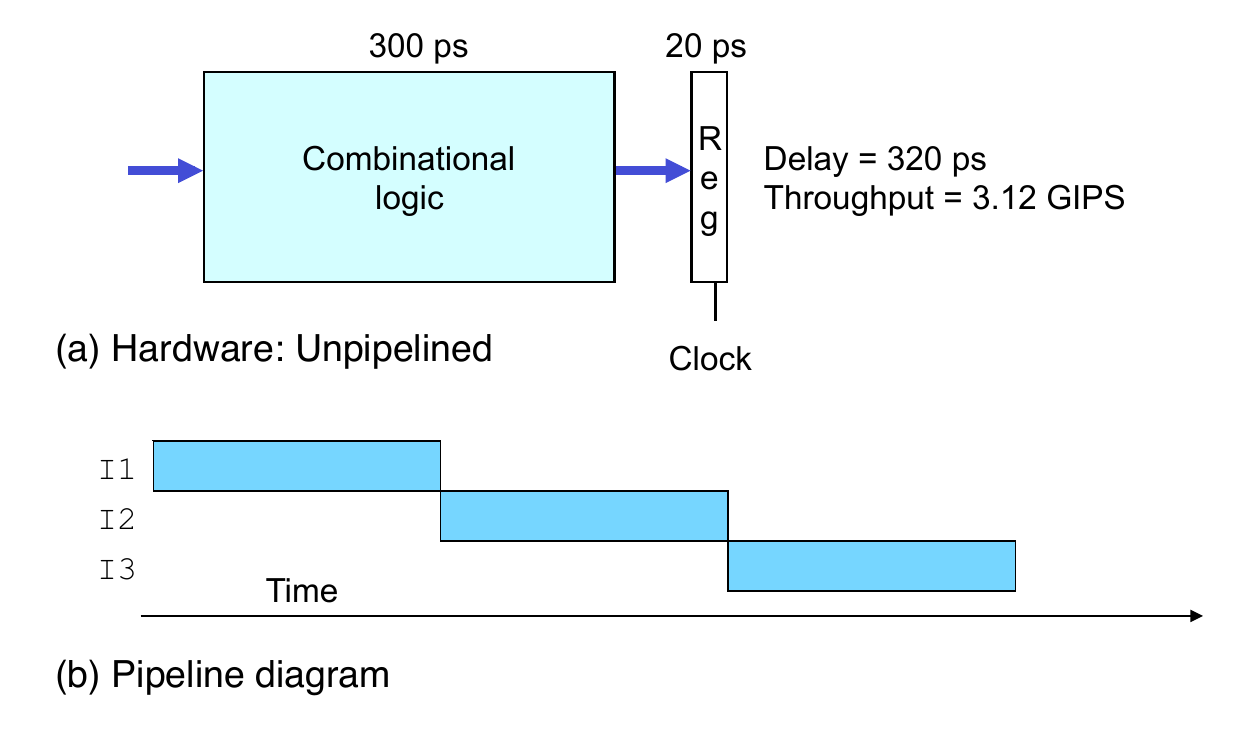
- System
- Computation requires total of 300 picoseconds (ps)
- Additional 20 ps to save result in register
- Must have clock cycle of at least 320 ps
3-Way Pipelined Version
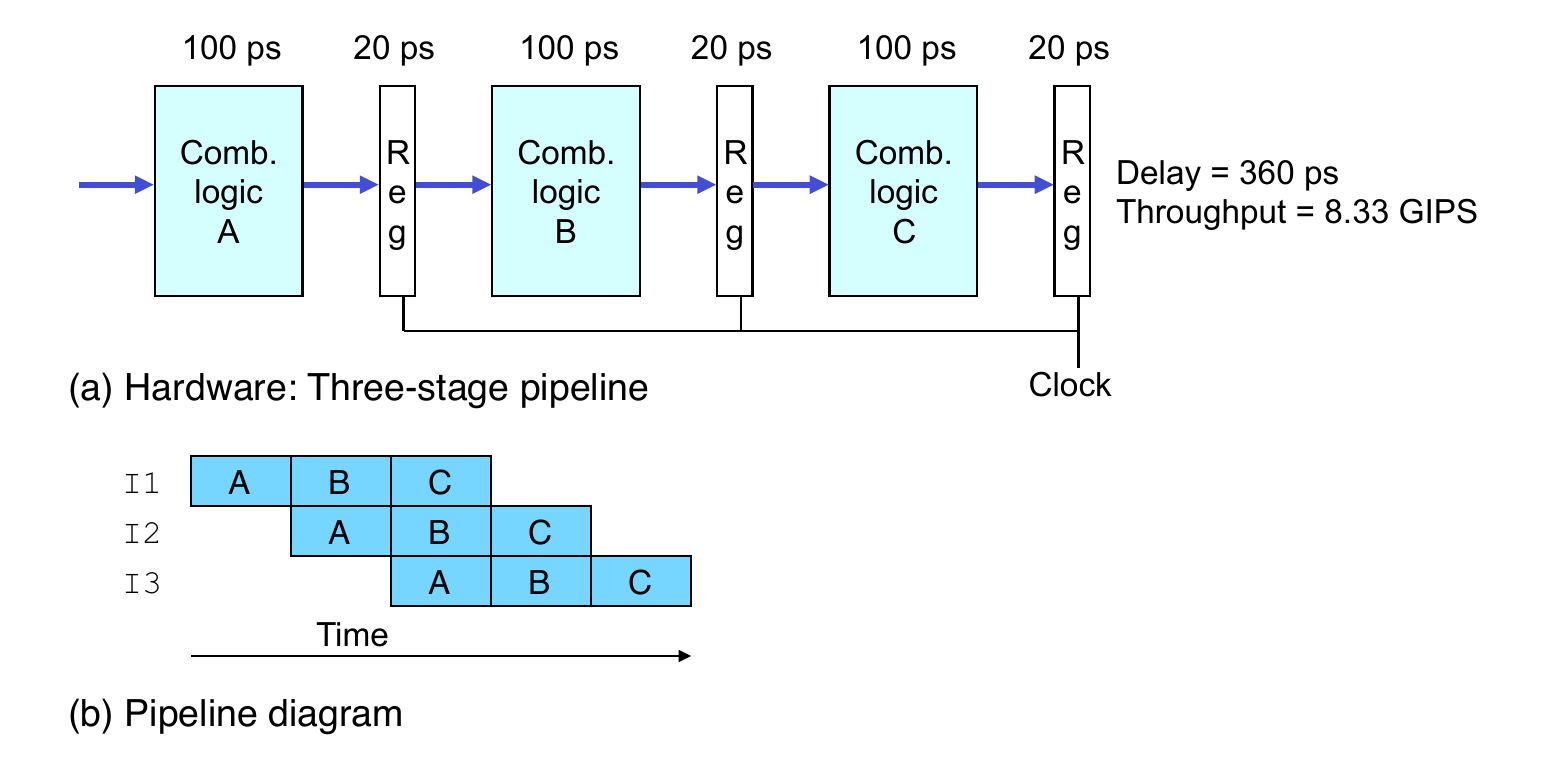
- System
- Divide combinational logic into 3 blocks of 100 ps each
- Can begin new operation as soon as previous one passes through stage A
- begin new operation every 120 ps
- Overall latency increases
- 360 ps from start to finish
Limitations: Nonuniform Delays
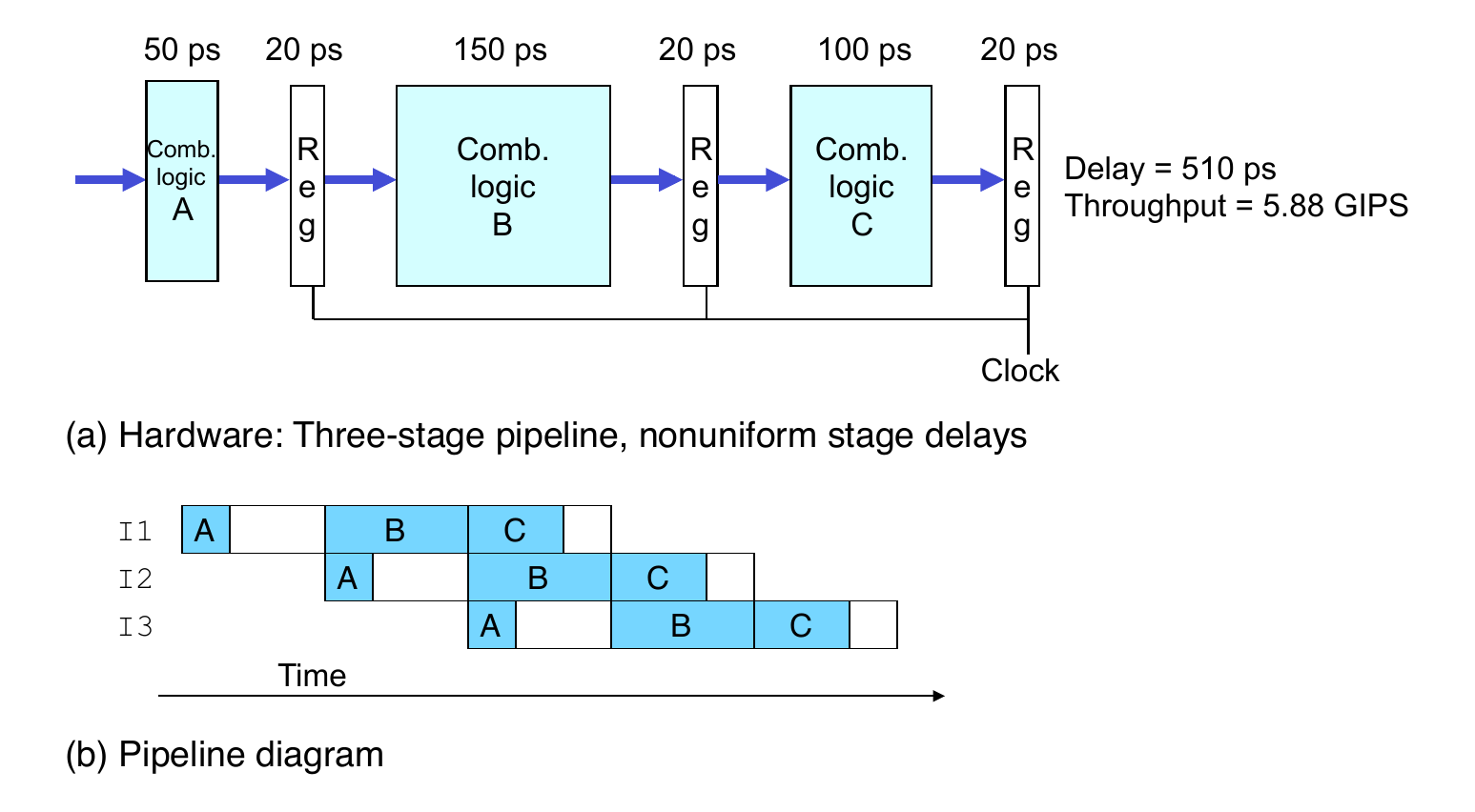
- Throughput limited by slowest stage
- Other stages sit idle for much of the time
- Challenging to partition system into balanced stages
Limitations: Register Overhead

- As the pipeline deepens, overhead of loading registers becomes more significant
- High speeds of modern processors designs are obtained through very deep pipelining
Data Dependencies
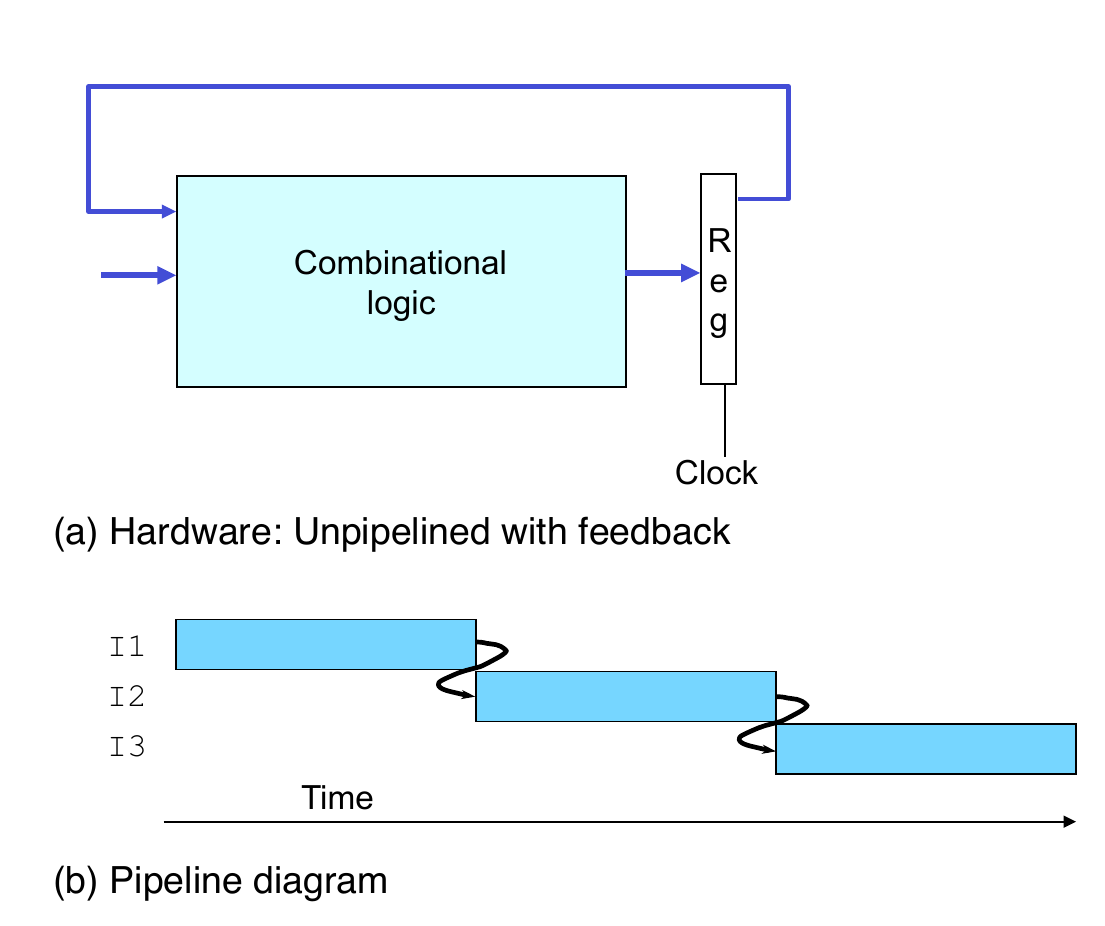
- Each operation depends on result from preceding one
Data Hazards
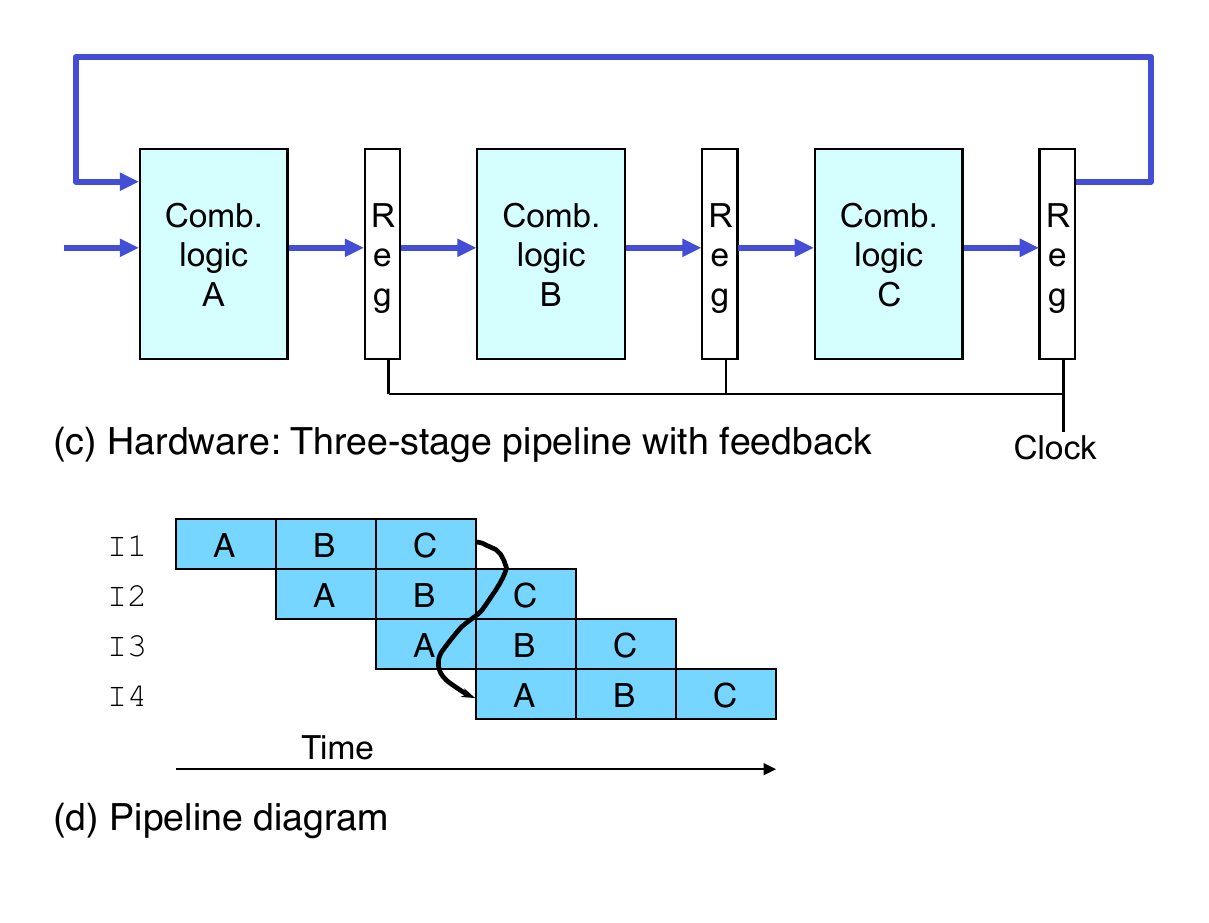
- Result does not feed back around in time for next operation
- Pipelining has changed system behavior
Data Dependencies in Processors
irmovq $50, %rax
addq %rax, %rbx
mrmovq 100(%rbx), %rdx- Result from one instruction used as operand for another
- Read-after-write (RAW) dependency
- Common in actual programs
- Must make sure our pipeline handles these properly
- get correct results
- minimize performance impact
Sequential Hardware
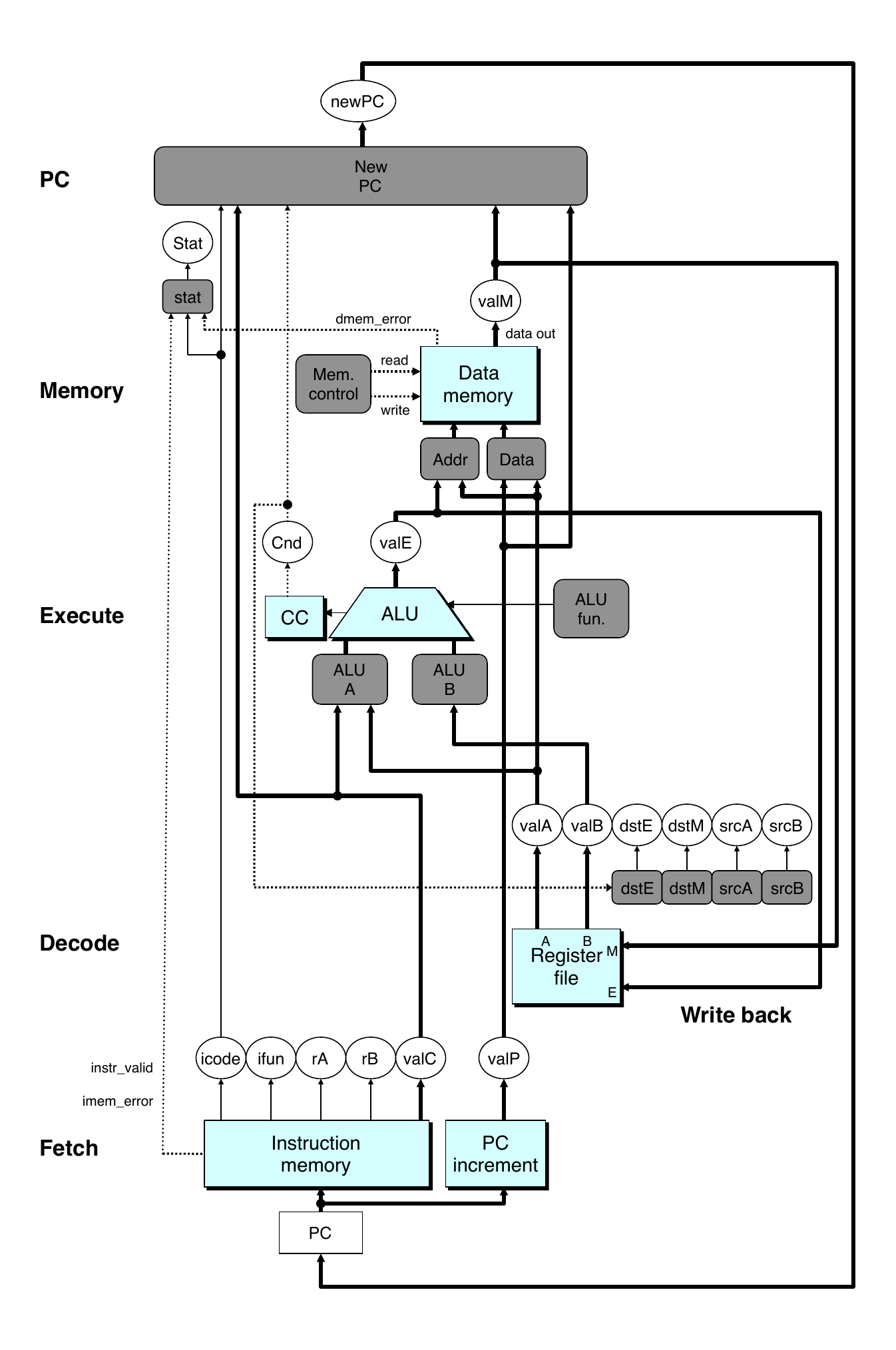
Modified Sequential Hardware
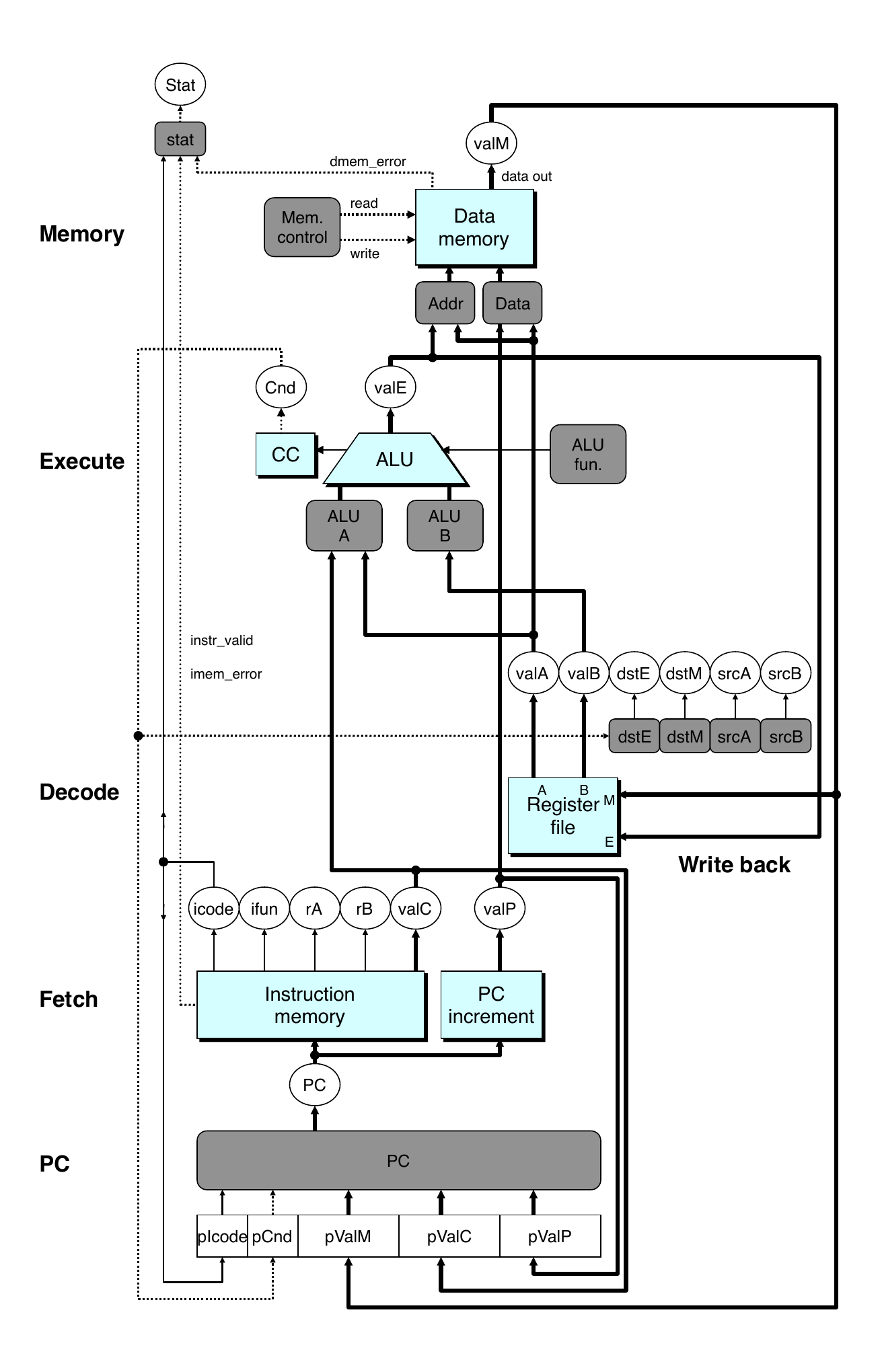
Modified Sequential Hardware
- Reorder PC stage to be at the beginning
- PC stage
- Task is to select PC for current instruction
- Based on results computed by previous instruction
- Processor state
- PC is no longer stored in register
- PC can be determined based on other stored information
Pipeline Stages
- Fetch
- Select current PC
- Read instruction
- Compute incremented PC
- Decode
- Read program registers
- Execute
- Operate ALU
- Memory
- Read or write data memory
- Write Back
- Update register file
Pipelined Hardware
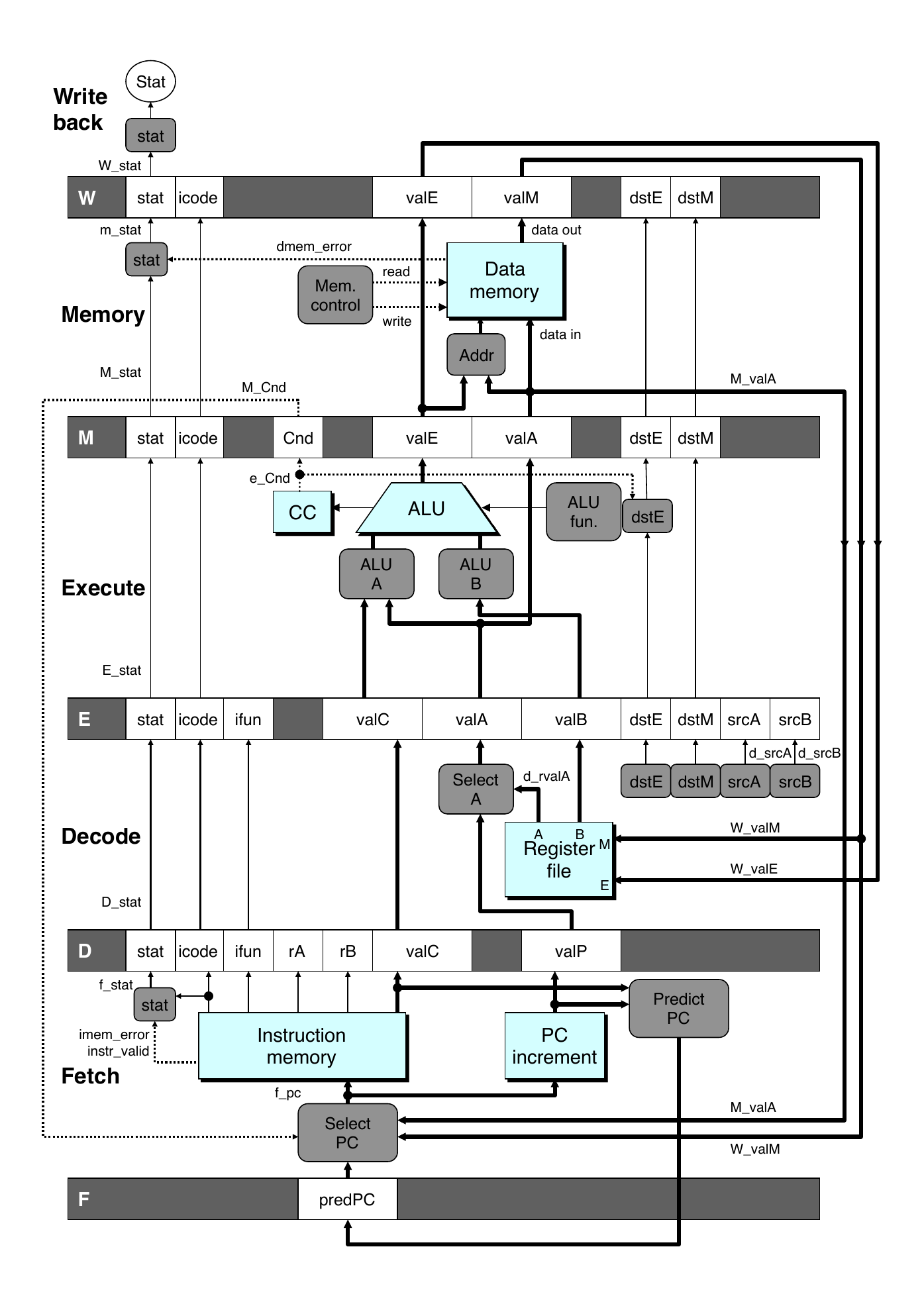
Pipelined Hardware
- Pipeline registers hold intermediate values from instruction execution
- Forward Paths
- Values passed from one stage to the next
- Cannot jump past stages
- For example,
valCpasses through decode
- For example,
- Signal naming conventions
S_Field: value of field held in stage S pipeline registers_Field: value of field computed in stage S
Feedback Paths
- Predicted PC
- Guess value of next PC
- Branch information
- Jump taken/not taken
- Fall-through or target address
- Return point
- Read from memory
- Register updates
- To register file write ports
Predicting the PC

- Start fetch of new instruction after current one has completed fetch stage
- Not enough time to reliably determine next instruction
- Guess which instruction will follow
- Recover if prediction was incorrect
Pipeline Demonstration

Data Dependencies: 3 nop Instructions
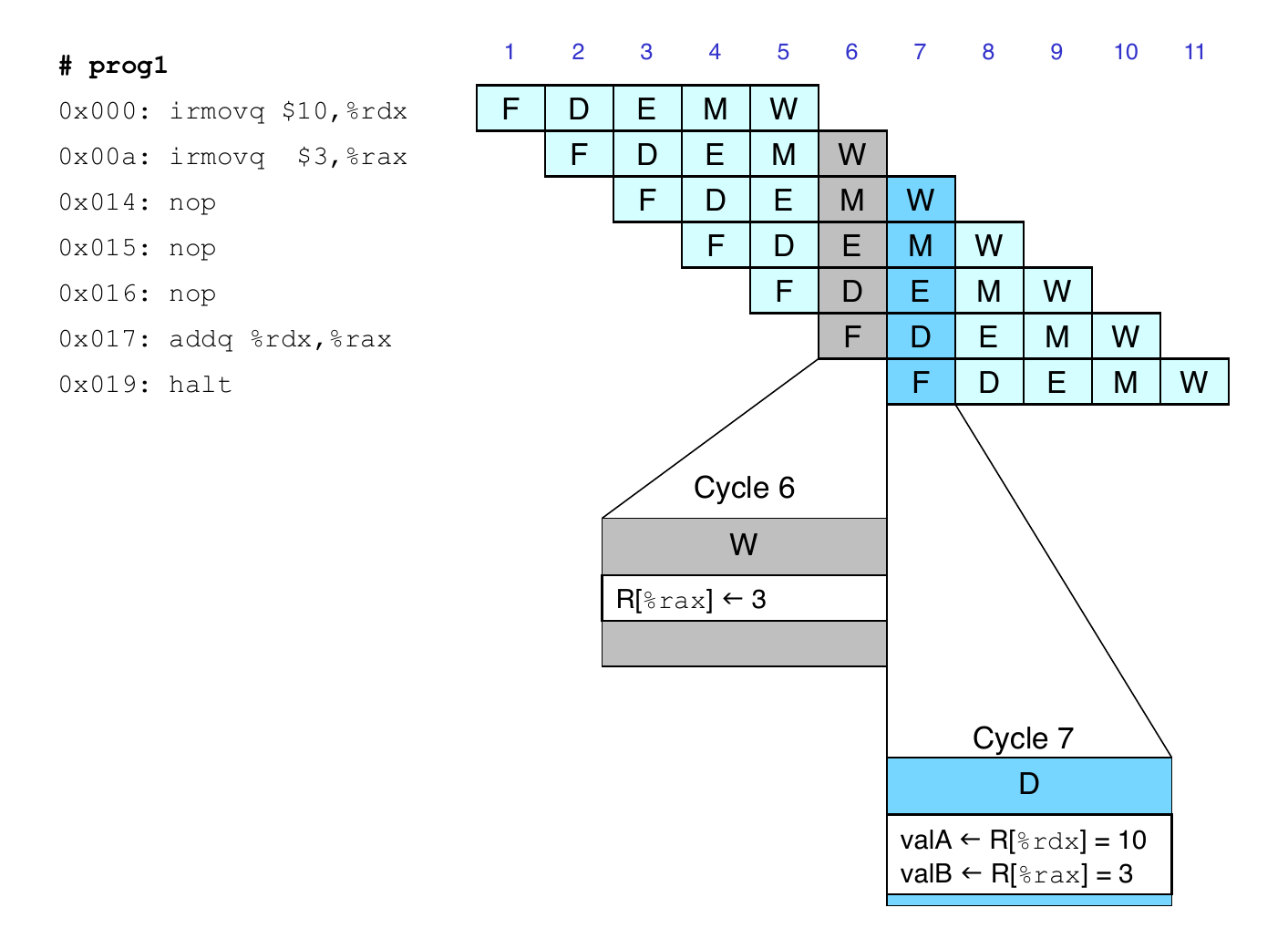
Data Dependencies: 2 nop Instructions
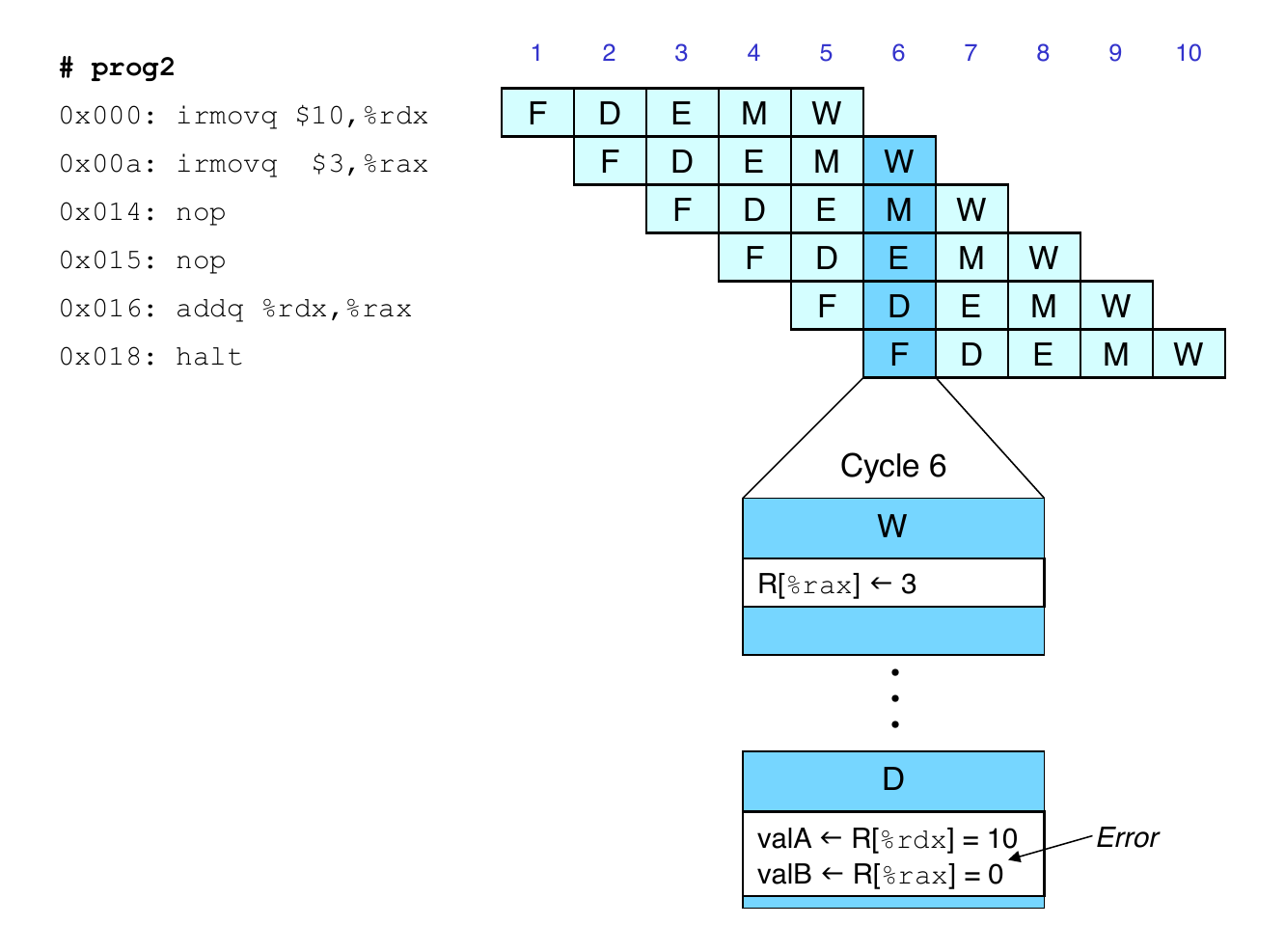
Data Dependencies: 1 nop Instruction
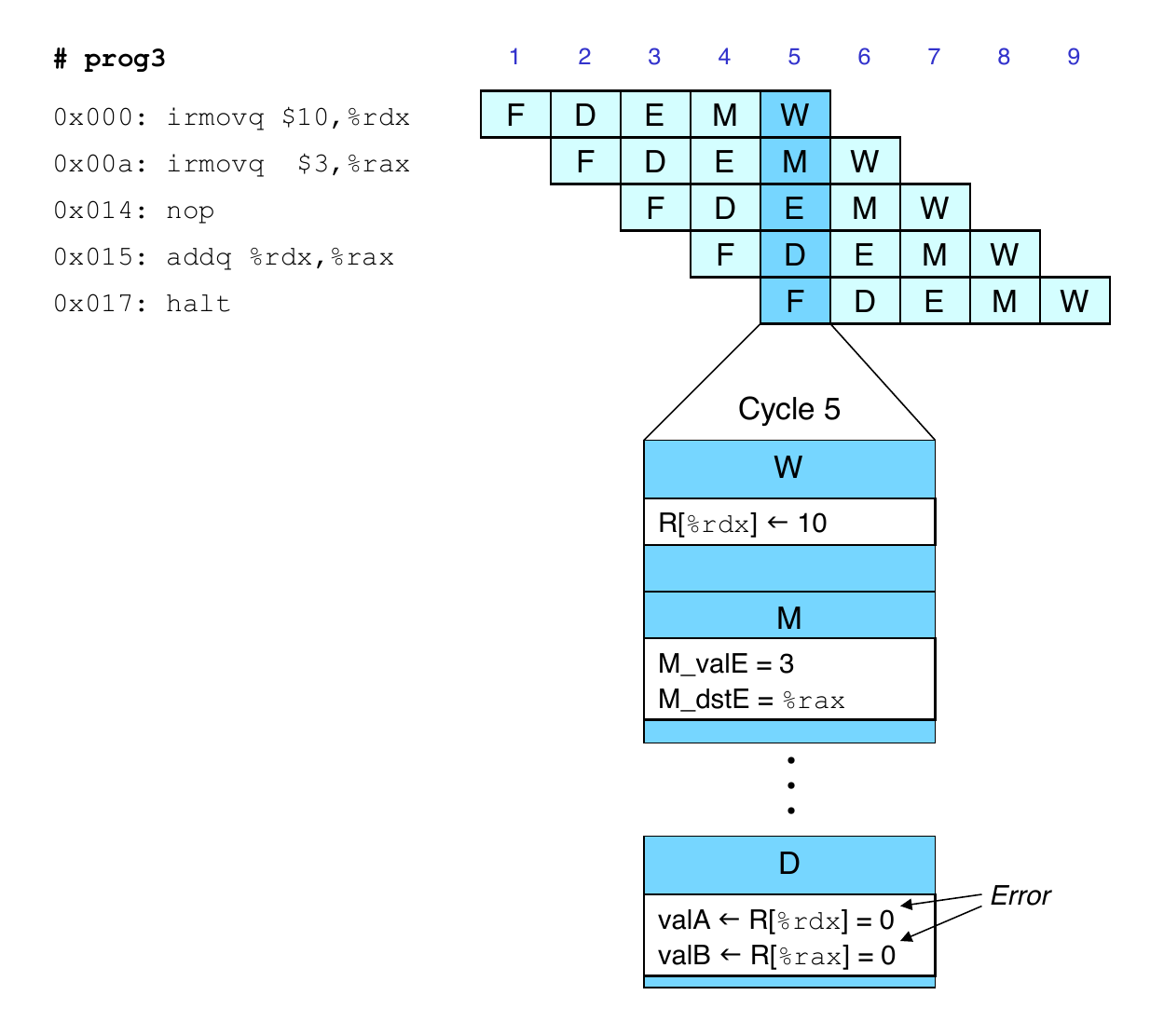
Data Dependencies: No nop Instruction
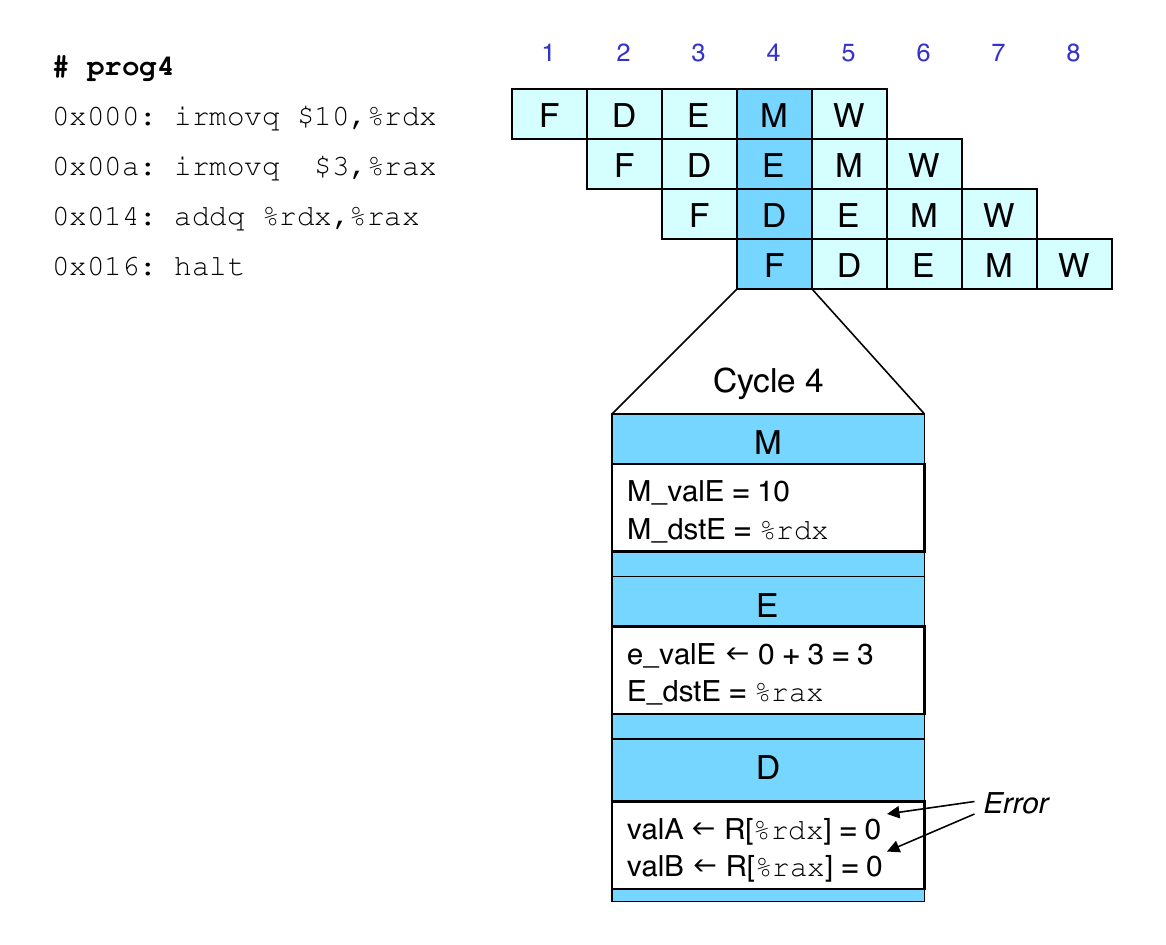
Stalling for Data Dependencies

- If instruction follows too closely after one that writes to register, then slow it down
- Hold instruction in decode
- Dynamically inject
nopinto execute stage
Stall Condition
- Source Registers
srcAandsrcBof current instruction in decode stage
- Destination Registers
dstEanddstMfields- Instructions in execute memory, and write back stages
- Special case
- Do not stall for register ID 15 (
0xF)- Indicates absence of register operand
- Or failed conditional move
- Do not stall for register ID 15 (
Stall Example

What Happens When Stalling
- Stalling instruction held back in decode stage
- Following instruction stays in fetch stage
- Bubbles injected into execute stage
- Like dynamically generated
nops - Move through later stages
- Like dynamically generated
Implementing Stalling
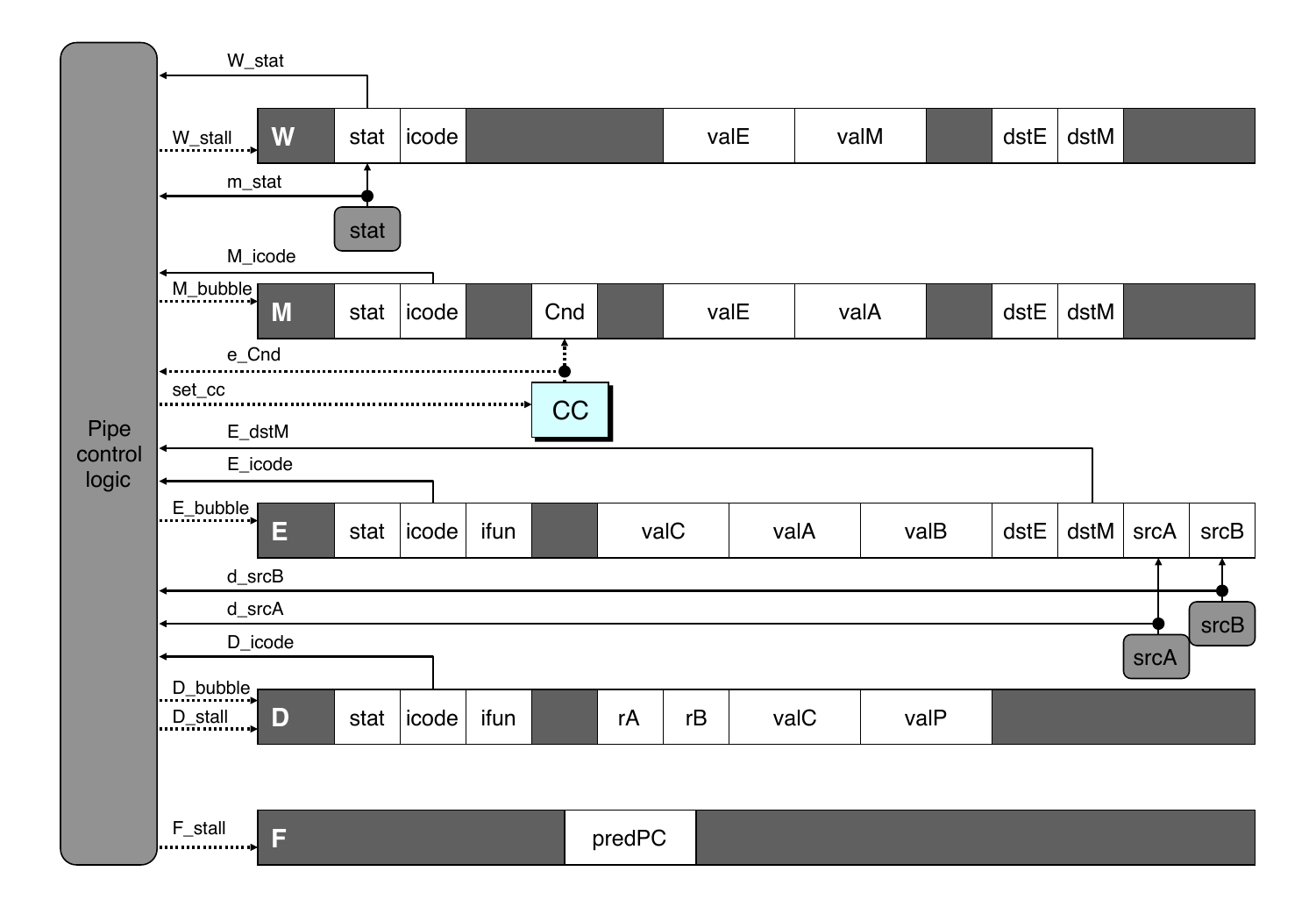
- Pipeline Control
- Combinational logic detects stall condition
- Sets mode signals for how pipeline registers should update
Data Forwarding
- Basic Pipeline
- Register is not written until completion of write back stage
- Source operands read from register file in decode stage
- Needs to be in register file at start of stage
- Observation
- Value generated in execute or memory stage
- Trick
- Pass value directly from generating instruction to decode stage
- Needs to available at end of decode stage
Data Forwarding Example
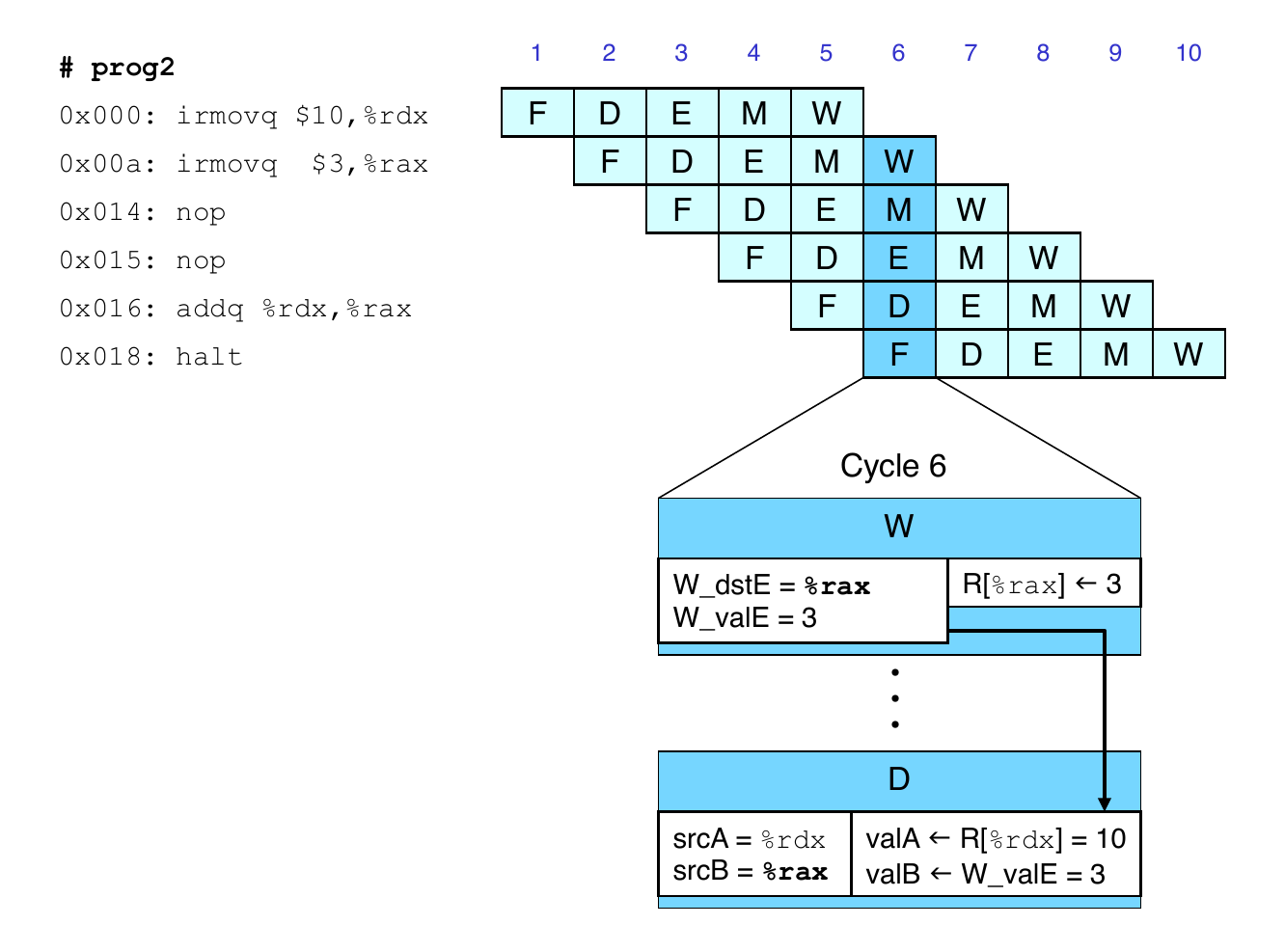
irmovqin write back stage- Destination value in W pipeline register
- Forward as
valBfor decode stage
Data Forwarding Example

- Register
%rdx- Generated by ALU during previous cycle
- Forwarded from memory as
valA
- Register
%rax- Generated by ALU
- Forwarded from execute as
valB
Forwarding Priority
- Multiple forwarding choices
- Which one should have priority
- Match serial semantics
- Use matching value from earliest pipeline stage
Implementing Forwarding
Add additional feedback paths from E, M, and W pipeline registers into decode stage
Create logic blocks to select from multiple sources for
valAandvalBin decode stage
Implementing Forwarding
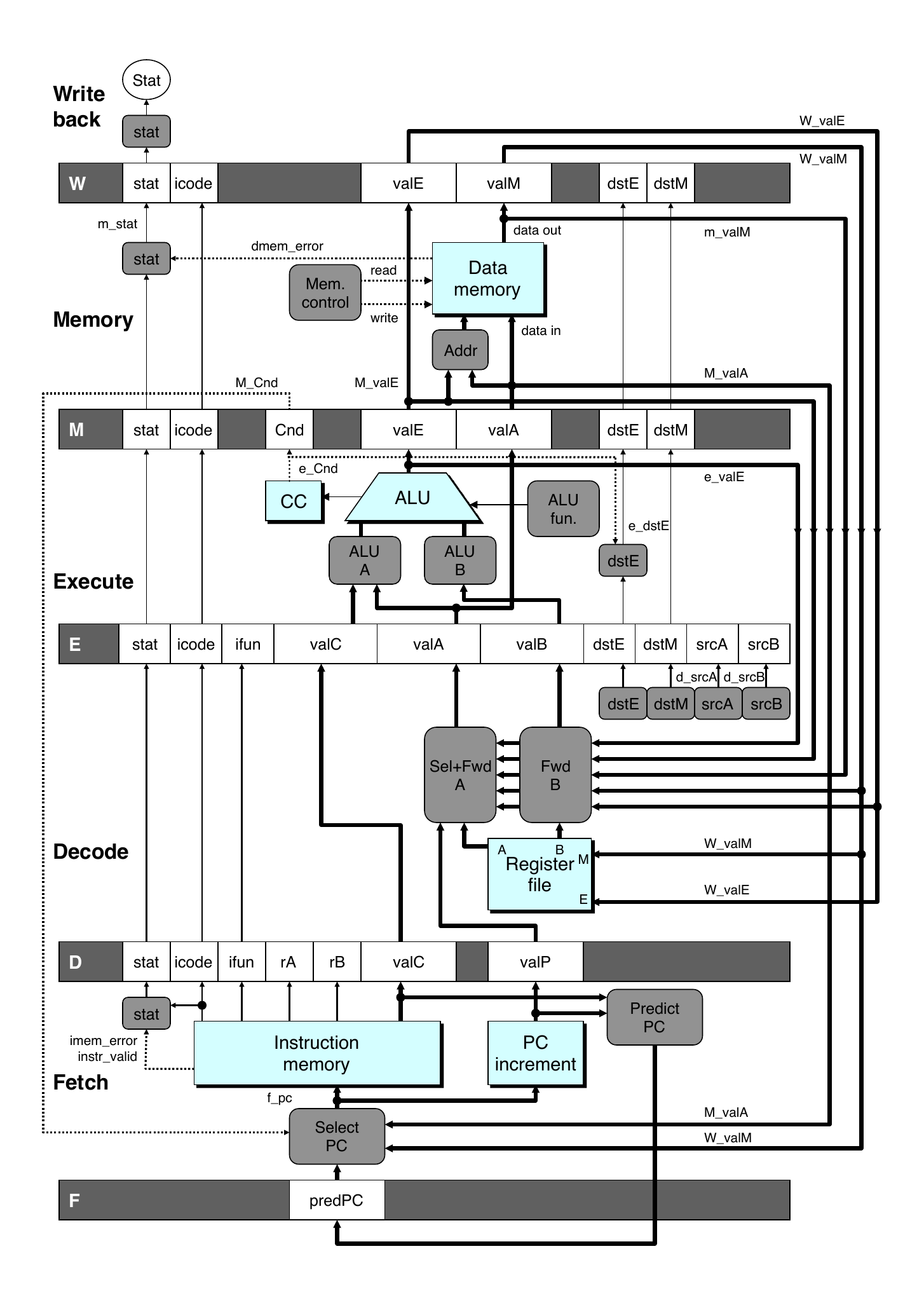
Limitation of Forwarding
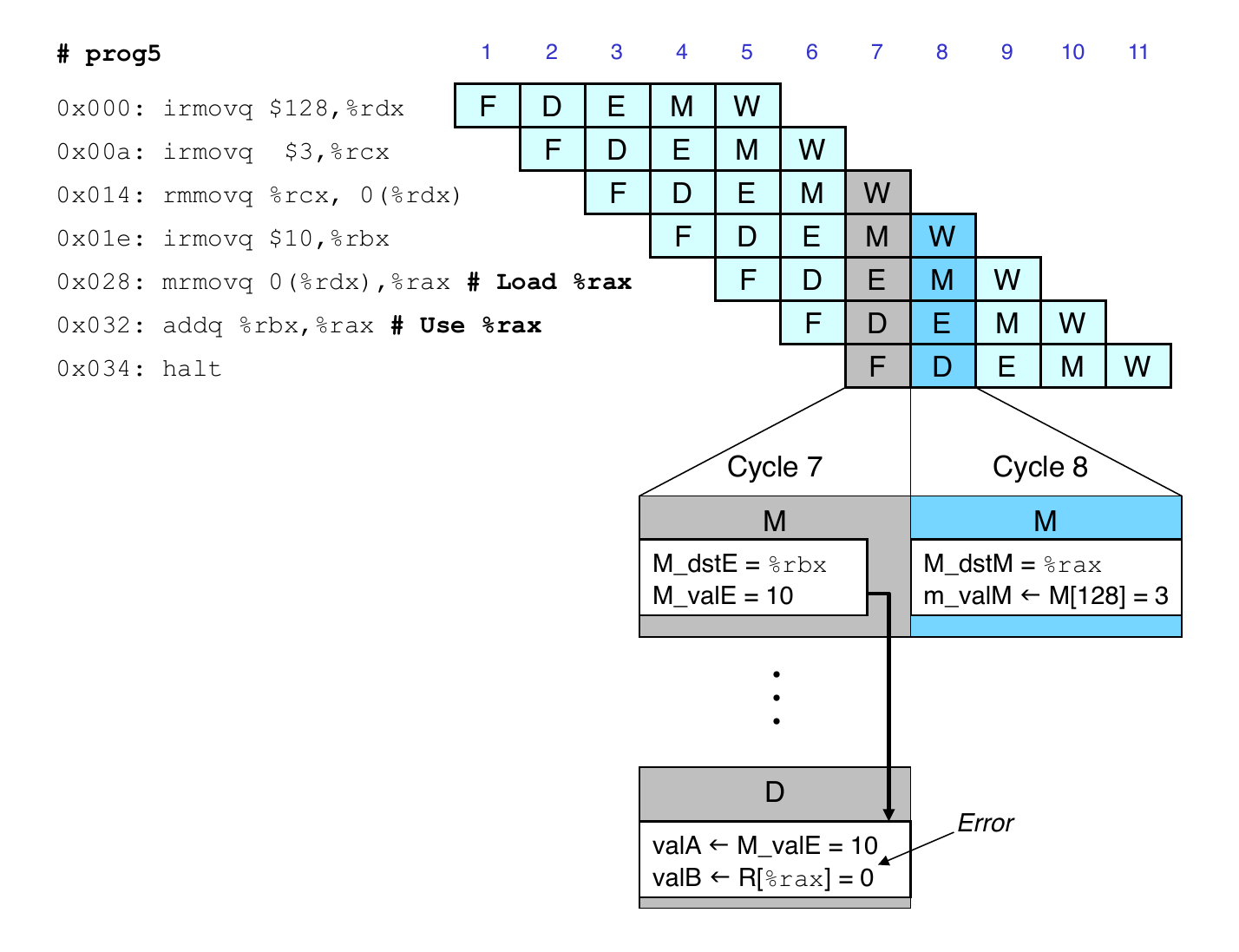
- Load-use dependency
- Value needed by end of decode cycle 7
- Value read from memory in memory stage of cycle 8
Avoiding Load/Use Hazard

- Stall using instruction for one cycle
- Can then pick up loaded value by forwarding from memory stage
Load/Use Hazard Implementation
- Detecting load/use hazard
- If
E_icodeisimrmovqorpopqandE_dst_Misd_srcAord_srcB
- If
- Control for load/use hazard
- Stall instructions in fetch and decode stages
- Inject bubble into execute stage
Branch Misprediction Example
0x000: xorq %rax, %rax
0x002: jne t # not taken
0x00b: irmovq $1, %rax # fall through
0x015: nop
0x016: nop
0x017: nop
0x018: halt
0x019: t: irmovq $3, %rdx # target
0x023: irmovq $4, %rcx # should not execute
0x02d: irmovq $5, %rdx # should not execute- Should only execute first 8 instructions
Handling Branch Misprediction
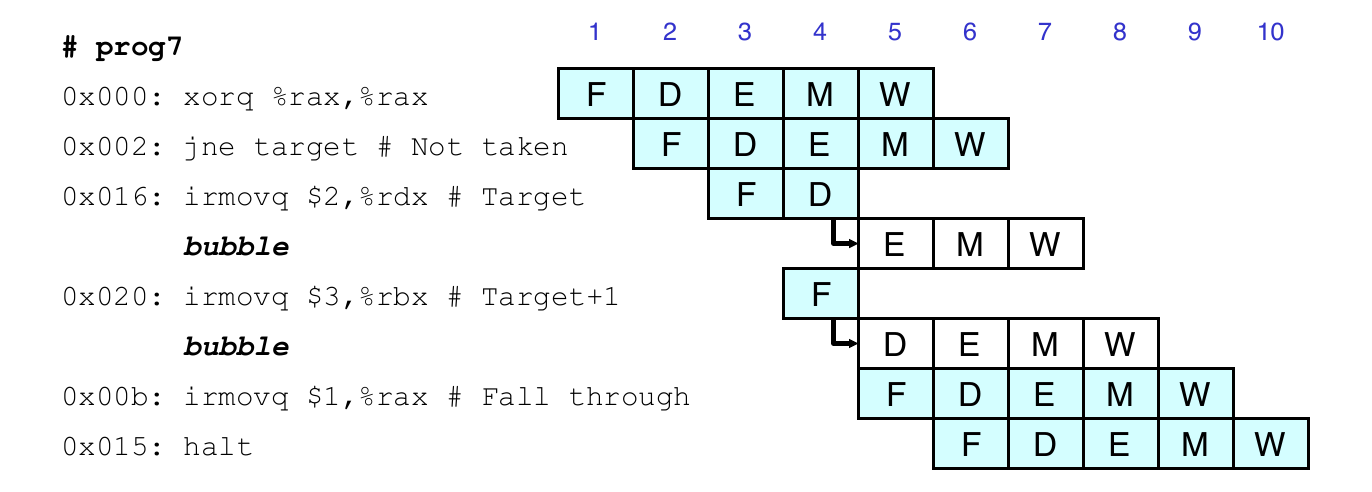
- Predict branch as taken
- Fetch 2 instructions at target
- Cancel when mispredicted
- Detect branch not-taken in execute stage
- On following cycle, replace instructions in execute and decode bubbles
- No side effects have occurred yet
Branch Misprediction Implementation
- Detecting branch misprediction
- If
E_icodeisjXXand note_Cnd
- If
- Control for branch misprediction
- Inject bubble into decode and execute stages
Return Example
0x000: irmovq Stack, %rsp # intialize stack pointer
0x00a: call p # procedure call
0x013: irmovq $5, %rsi # return point
0x01d: halt
0x020: .pos 0x20
0x020: p: irmovq $-1, %rdi # procedure
0x02a: ret
0x02b: irmovq $1, %rax # should not be executed
0x035: irmovq $2, %rax # should not be executed
0x03f: irmovq $3, %rax # should not be executed
0x049: irmovq $4, %rax # should not be executed
0x100: .pos 0x100
0x100: Stack: # Stack pointerCorrect Return Example

- As
retpasses through pipeline, stall at fetch stage- While in decode, execute, and memory stage
- Inject bubble into decode stage
- Release stall write back stage is reached
Return Implementation
- Detecting branch misprediction
- If
D_icodeorE_icodeorM_icodeisret
- If
- Control for branch misprediction
- Stall fetch stage
- Inject bubble into decode stage
Special Control Cases
Detection
Condition Trigger Processing retIRET in {C_icode, E_icode, M_icode}Load/use hazard E_icode in {IMRMOVQ, IPOPQ} && E_dstM in {d_srcA, d_srcB}Mispredicted branch E_icode = IJXX & !e_CndAction (on next cycle)
Condition Fetch Decode Execute Memory Write back Processing retstall bubble normal normal normal Load/use hazard stall stall bubble normal normal Mispredicted branch normal bubble bubble normal normal
Control Combinations

- Special cases that can arise on same clock cycle
- Combination A
- Not-taken branch
retinstruction
- Combination B
- Instruction that reads from memory to
rsp - Followed by
retinstruction
- Instruction that reads from memory to
Handling Control Combinations
- Combination A
- Should handle as mispredicted branch
- Stall fetch pipeline register
- PC selection logic will be using
M_valM
- Combination B
- Would attempt to bubble and stall pipeline register D
- Signaled by processor as pipeline error
- Load/use hazard should get priority
retinstruction should be held in decode stage for additional cycle
Pipeline Summary
- Data Hazards
- Most handled by forwarding
- Load/use hazard requires one cycle stall
- Control Hazards
- Cancel instructions when mispredicted branch is detected
- Two clock cycles wasted
- Stall fetch stage while
retpasses through pipeline- Three clock cycles wasted
- Cancel instructions when mispredicted branch is detected
- Control combinations
- Must analyze carefully
- First version had subtle bug